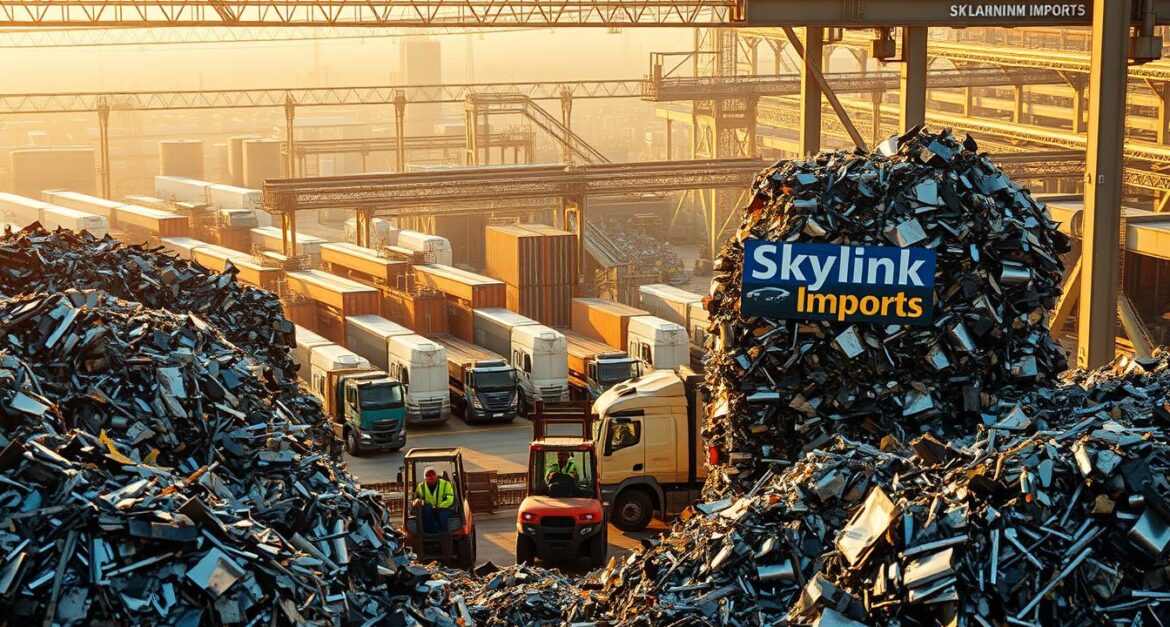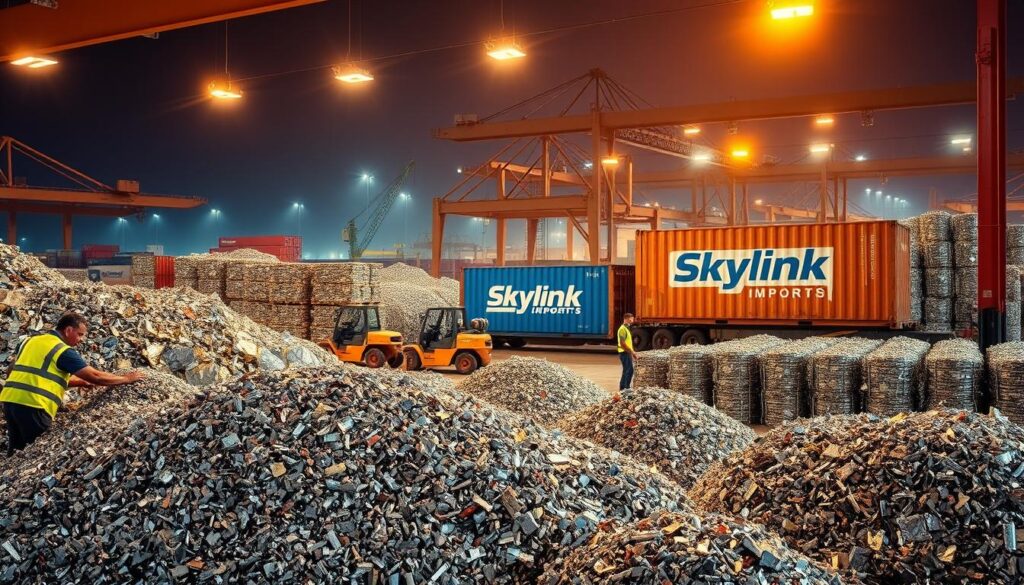
The global aluminium scrap market is witnessing significant growth, with exports playing a crucial role in meeting the increasing demand for sustainable raw materials. As a leading global import-export solutions provider, Skylink Imports emphasises the need for efficiency, reliability, and transparency in the aluminium scrap export process.
Adopting best practices for high-quality aluminium scrap exports is essential to ensure a competitive edge in the market. With expertise in sourcing, procurement, and logistics, Skylink Imports guides exporters through the complexities of the industry, promoting a seamless and profitable experience.
Key Takeaways
- Efficiency is crucial in aluminium scrap exports.
- Reliability and transparency are key to a successful export process.
- Skylink Imports provides expert guidance for exporters.
- Best practices ensure high-quality aluminium scrap exports.
- Expertise in sourcing and logistics is vital for export success.
The Evolving Landscape of the Global Aluminium Scrap Market
The global aluminium scrap market is undergoing significant transformations due to changing market dynamics and growing demand. As a key player in this industry, companies like Skylink Imports, headquartered in Calgary with strong operational roots in India, are well-positioned to capitalise on emerging trends.

The aluminium scrap market is influenced by various factors, including environmental regulations, technological advancements, and shifting trade policies. Understanding these dynamics is crucial for exporters looking to adopt top aluminium scrap export strategies.
Current Market Trends and Growing Demand
The demand for aluminium scrap is on the rise, driven by the increasing need for sustainable and recycled materials in various industries. This growing demand is expected to continue, driven by government initiatives and consumer preferences for eco-friendly products.
Key drivers of this demand include the automotive and construction industries, where aluminium is widely used. The trend towards electric vehicles and sustainable infrastructure is further boosting the demand for recycled aluminium.
Key Importing Countries and Market Opportunities
Several countries are emerging as significant importers of aluminium scrap, driven by their growing industrial needs and environmental policies. Understanding these market opportunities is crucial for exporters looking to expand their global footprint.
- India is a major importer, driven by its growing automotive and construction sectors.
- Countries in Southeast Asia, such as Vietnam and Indonesia, are also increasing their imports due to expanding manufacturing capabilities.
- European nations, with their strong focus on recycling and sustainability, are significant importers of high-quality aluminium scrap.
Price Dynamics and Value Fluctuations
The price of aluminium scrap is subject to various market forces, including global demand, supply chain disruptions, and commodity prices. Exporters must navigate these fluctuations to ensure competitive pricing and profitability.
Factors influencing price dynamics include:
- Global aluminium prices and their impact on scrap value.
- Trade policies and tariffs affecting aluminium scrap exports.
- Supply chain logistics and transportation costs.
By understanding these factors, exporters can adopt effective aluminium scrap quality practices and export aluminium scrap strategies to maximise their returns.
Essential Quality Standards for Successful Aluminium Scrap Exports
The key to successful aluminium scrap exports lies in understanding and implementing international quality norms. To improve aluminium scrap export quality, it’s crucial to adhere to globally recognised standards and classifications.
International Classification Systems and Grades
Aluminium scrap is categorised into various grades based on its composition, purity, and other characteristics. The most widely used classification system is maintained by the International Scrap Recycling Institute (ISRI). Understanding these classifications is vital for exporters to ensure their products meet the required standards.
For instance, ISRI specifications categorise aluminium scrap into different grades such as Taint Tabor and New Aluminium, each with its own set of characteristics and acceptable contamination levels. Exporters must familiarise themselves with these categories to supply high-quality scrap.

ISRI Specifications and Industry Standards
ISRI specifications play a crucial role in defining the quality of aluminium scrap. These standards help in maintaining consistency and quality across different shipments and suppliers. For example, ISRI provides detailed guidelines on the acceptable levels of contamination, chemical composition, and physical characteristics for various aluminium scrap grades.
“The quality of aluminium scrap is paramount in determining its suitability for recycling and reuse. Adhering to ISRI specifications ensures that the scrap meets the required standards for international trade.”
Contamination Thresholds and Purity Requirements
Contamination is a significant factor in determining the quality of aluminium scrap. Exporters must ensure that their scrap meets the required purity levels and contamination thresholds. For instance, the presence of other metals, dirt, or non-metallic materials can significantly reduce the quality of the scrap.
| Scrap Grade | Maximum Contamination Level | Minimum Purity Requirement |
|---|---|---|
| Taint Tabor | 2% | 98% |
| New Aluminium | 1% | 99% |
To improve aluminium scrap export quality, exporters should implement rigorous quality control measures, including regular testing and inspection. For more information on enhancing your aluminium scrap export quality, you can contact experts at info@skylinkimports.com.
Strategic Sourcing of High-Quality Aluminium Scrap
To enhance aluminium scrap export methods, it’s crucial to focus on strategic sourcing that prioritises quality and reliability. This approach not only ensures a consistent supply of high-grade aluminium scrap but also contributes to the overall efficiency of the export process.
Building Relationships with Reliable Suppliers
Establishing strong relationships with reliable suppliers is the foundation of strategic sourcing. This involves:
- Conducting thorough background checks to ensure suppliers have a proven track record of delivering high-quality aluminium scrap.
- Negotiating contracts that include strict quality control measures and penalties for non-compliance.
- Regularly communicating with suppliers to stay informed about market trends and potential disruptions.
By fostering these relationships, exporters can optimise their aluminium scrap export process, reducing the risk of contamination or substandard material.
Evaluating Scrap Sources for Optimal Quality
Evaluating potential scrap sources is critical to maintaining the quality of aluminium scrap exports. This includes:
- Assessing the source of the scrap material to ensure it meets international quality standards.
- Inspecting the material for signs of contamination or degradation.
- Implementing a robust testing regimen to verify the quality and composition of the scrap.
Skylink Imports, with its expertise in sourcing and procurement, exemplifies best practices in evaluating and selecting high-quality aluminium scrap sources.
Creating Sustainable and Ethical Supply Chains
In today’s global market, creating sustainable and ethical supply chains is not just a moral imperative but a business necessity. This involves:
- Ensuring that sourcing practices comply with environmental regulations and minimise ecological impact.
- Promoting fair labour practices throughout the supply chain.
- Engaging in transparent business practices that foster trust among stakeholders.
By adopting these strategies, companies like Skylink Imports can enhance their brand reputation and contribute to a more sustainable aluminium scrap export industry.
For more information on how to optimise your aluminium scrap export methods and learn about our sourcing strategies, please contact us at +1 (403)266-9394 or +91-9041-543543.
Discover The Best Practices For Best Quality Aluminium Scrap Exports
Skylink Imports emphasises the importance of adopting best practices for the best quality aluminium scrap exports to maintain a competitive edge in the global market. By implementing these practices, exporters can ensure compliance with international standards, enhance customer satisfaction, and ultimately drive business growth.
Comprehensive Inspection and Quality Control Protocols
Implementing rigorous inspection and quality control protocols is crucial for ensuring the quality of aluminium scrap exports. This involves:
- Conducting thorough visual inspections to detect contaminants and impurities
- Utilising advanced analytical techniques such as spectroscopy for material verification
- Implementing a robust sampling protocol to ensure a representative quality assessment
By adopting these measures, exporters can significantly reduce the risk of quality disputes and enhance customer trust.
Advanced Sorting and Processing Techniques
Advanced sorting and processing techniques play a vital role in enhancing the quality of aluminium scrap. Techniques such as:
- Magnetic separation to remove ferrous contaminants
- Eddy current separation for non-ferrous metal recovery
- Sensor-based sorting for precise material classification
enable exporters to achieve higher purity levels and meet specific customer requirements.
Essential Documentation and Certification Requirements
Proper documentation and certification are critical for compliance with international regulations and for facilitating smooth customs clearance. Essential documents include:
- Certificates of origin and quality
- Compliance certificates for environmental and safety regulations
- Detailed inventory reports and packing lists
Skylink Imports stresses the importance of accurate and timely documentation to avoid delays and legal issues.
Innovative Packaging and Storage Solutions
Innovative packaging and storage solutions are vital for maintaining the quality of aluminium scrap during transportation and storage. This includes:
- Using durable, weather-resistant packaging materials
- Implementing secure bundling and strapping techniques
- Employing climate-controlled storage facilities to prevent degradation
By adopting these practices, exporters can minimise damage and contamination, ensuring that the aluminium scrap reaches the customer in optimal condition.
In conclusion, adopting best practices for best quality aluminium scrap exports is a multifaceted approach that requires attention to detail, advanced technology, and a commitment to excellence. By following these guidelines, exporters can enhance their reputation, improve customer satisfaction, and drive long-term success in the competitive global market.
Value-Adding Processing and Preparation Methods
Advanced processing and preparation methods play a vital role in determining the quality and value of aluminium scrap exports. To stay competitive in the global market, exporters must adopt effective strategies that enhance the quality of their aluminium scrap.
Effective Cleaning and Decontamination Approaches
Cleaning and decontamination are critical steps in preparing aluminium scrap for export. Effective methods include:
- Mechanical cleaning to remove dirt and debris
- Chemical treatments to eliminate contaminants
- Advanced technologies like electrostatic separation
These approaches ensure that the aluminium scrap meets international quality standards, thereby increasing its value.
Strategic Sorting and Material Segregation
Sorting and segregation are essential for maximising the value of aluminium scrap. By categorising scrap based on alloy type, purity, and other characteristics, exporters can:
- Enhance the overall quality of their product
- Meet specific customer requirements
- Command higher prices in the market
Optimal Size Reduction and Density Improvement
Size reduction and density improvement are crucial for efficient transportation and processing of aluminium scrap. Techniques such as shredding, baling, and compacting can significantly reduce shipping costs and improve the overall value of the scrap.
Pre-Export Processing for Maximum Value
Pre-export processing involves a series of steps designed to maximise the value of aluminium scrap before it is shipped. This includes:
- Final inspections and quality control checks
- Specialised packaging to prevent contamination during transit
- Documentation and certification to meet export regulations
By focusing on these pre-export processes, aluminium scrap exporters can ensure that their products are of the highest quality and ready for international markets.
Implementing these value-adding processing and preparation methods can significantly enhance the competitiveness of aluminium scrap exporters, particularly in markets like India, where demand for high-quality scrap is growing.
Navigating Regulatory Compliance and Documentation
Navigating the intricacies of regulatory compliance is crucial for successful aluminium scrap exports. The process involves a multitude of steps, each critical to ensuring that shipments are not delayed or seized by authorities.
Securing Necessary Export Licenses and Permits
To export aluminium scrap, businesses must first secure the necessary licenses and permits. This involves understanding the specific regulations of the exporting country, as well as those of the destination country. Key documents may include an export license, a certificate of origin, and compliance certificates.
- Researching the required licenses and permits for aluminium scrap export
- Ensuring compliance with both domestic and international regulations
- Maintaining up-to-date documentation to avoid delays
Meeting Environmental Regulations and Standards
Environmental regulations play a significant role in the aluminium scrap export industry. Exporters must comply with standards related to waste management, pollution control, and environmental protection. This includes adhering to guidelines on the handling and disposal of hazardous materials.
- Understanding environmental regulations applicable to aluminium scrap
- Implementing practices that minimise environmental impact
- Obtaining certifications that demonstrate environmental compliance
Mastering Customs Documentation and Procedures
Customs documentation is a critical aspect of exporting aluminium scrap. Accurate and complete documentation ensures that shipments clear customs without issue. Key documents include commercial invoices, packing lists, and certificates of origin.
To master customs procedures, exporters should:
- Familiarise themselves with the Harmonised System (HS) codes for aluminium scrap
- Ensure accurate classification and valuation of shipments
- Comply with customs regulations in both the exporting and importing countries
Leveraging International Trade Agreements
International trade agreements can significantly impact the aluminium scrap export industry. By understanding and leveraging these agreements, exporters can reduce tariffs, simplify procedures, and gain a competitive edge. Examples include the Generalised System of Preferences (GSP) and free trade agreements (FTAs).
To leverage these agreements, businesses should:
- Stay informed about relevant trade agreements and their terms
- Ensure compliance with rules of origin and other requirements
- Utilise preferential tariffs and other benefits where applicable
By navigating the complex landscape of regulatory compliance and documentation, aluminium scrap exporters can ensure smooth, efficient, and profitable operations. This involves a combination of understanding regulations, securing necessary documents, and leveraging trade agreements.
Optimising Logistics and Transportation for Scrap Exports
To ensure timely and cost-effective delivery, optimising logistics for aluminium scrap exports is essential. Efficient logistics and transportation systems are the backbone of the aluminium scrap export industry, enabling businesses to deliver high-quality products to global markets.
Container Loading Efficiency and Best Practices
Maximising container loading efficiency is crucial for reducing shipping costs and enhancing the overall export process. This involves careful planning and execution to ensure that containers are filled to optimal capacity without compromising the quality of the aluminium scrap.
Best practices include:
- Accurate weight and volume calculations
- Proper segregation of different scrap types
- Securing cargo to prevent damage during transit
- Utilising container space effectively
Strategic Shipping Routes and Carrier Selection
Choosing the right shipping routes and carriers is vital for ensuring timely delivery and minimising costs. Strategic route planning involves analysing various factors such as distance, fuel costs, and potential delays.
When selecting carriers, exporters should consider factors like reliability, reputation, and the ability to handle specific types of aluminium scrap. Building strong relationships with carriers can lead to better service and more favourable terms.
Cost Management and Freight Optimisation
Effective cost management is critical in the competitive aluminium scrap export market. Exporters must optimise freight costs by negotiating with carriers, consolidating shipments when possible, and staying informed about market rates.
Freight optimisation strategies include:
- Regularly reviewing and adjusting shipping routes
- Utilising technology for real-time tracking and monitoring
- Considering alternative modes of transportation
Risk Mitigation Strategies During Transit
Mitigating risks during transit is essential to protect the value of aluminium scrap shipments. This includes implementing insurance coverage, securing cargo properly, and having contingency plans in place for potential disruptions.
By adopting these strategies, exporters can minimise losses and ensure a smoother export process. Staying informed about market trends and regulatory changes is also crucial for navigating the complexities of aluminium scrap exports.
Cultivating Strong Buyer Relationships in the US Market
Building trust with US buyers is the cornerstone of a successful aluminium scrap export business from India. To achieve this, exporters must focus on understanding the specific needs and preferences of American buyers, maintaining open lines of communication, and developing long-term partnerships.
Understanding American Buyer Requirements and Preferences
American buyers have specific requirements when it comes to aluminium scrap imports. These include:
- High-quality material with minimal contamination
- Consistent supply chains
- Compliance with environmental and regulatory standards
- Transparent pricing and documentation
To meet these requirements, Indian exporters must enhance their aluminium scrap export methods by investing in quality control measures, improving supply chain logistics, and staying updated on regulatory compliance.
Maintaining Transparent Communication Channels
Transparent communication is key to building trust with US buyers. This involves:
- Regular updates on shipment status and any potential delays
- Clear documentation of product specifications and certifications
- Prompt response to queries and concerns
By maintaining open and honest communication, exporters can prevent misunderstandings and build a reputation for reliability.
Developing Long-term Strategic Partnerships
Long-term partnerships are beneficial for both exporters and US buyers. To develop these partnerships, Indian exporters should focus on:
- Consistently delivering high-quality aluminium scrap
- Being flexible and adaptable to changing buyer needs
- Investing in mutual growth and development
Such partnerships can lead to stable, long-term business relationships that benefit both parties.
Effective Dispute Resolution and Quality Claims Management
Despite best efforts, disputes and quality claims can arise. To manage these effectively, exporters should:
- Have a clear and fair dispute resolution process in place
- Maintain detailed records of transactions and communications
- Work collaboratively with buyers to resolve issues promptly
By handling disputes professionally, exporters can maintain positive relationships even in challenging situations.
Conclusion: Achieving Excellence in Aluminium Scrap Exports
Achieving excellence in aluminium scrap exports requires a comprehensive understanding of the industry, adherence to best practices, and a commitment to quality and customer satisfaction. By adopting the strategies outlined in this article, exporters can enhance their competitiveness and achieve long-term success in the global aluminium scrap market.
At Skylink Imports, we are dedicated to providing expert guidance and support to exporters seeking to excel in the aluminium scrap export industry. To discover the best practices for best quality aluminium scrap exports and learn more about our services, please email us at info@skylinkimports.com or contact us at +1 (403)266-9394, +91-9041-543543.
By following the best practices and guidelines outlined in this article, exporters can ensure a successful and profitable business in the aluminium scrap export market. Skylink Imports is committed to helping exporters achieve their goals and navigate the complexities of the global aluminium scrap market.
Email us: info@skylinkimports.com
Contact us: +1 (403) 266-9394, +91-9041-543543





